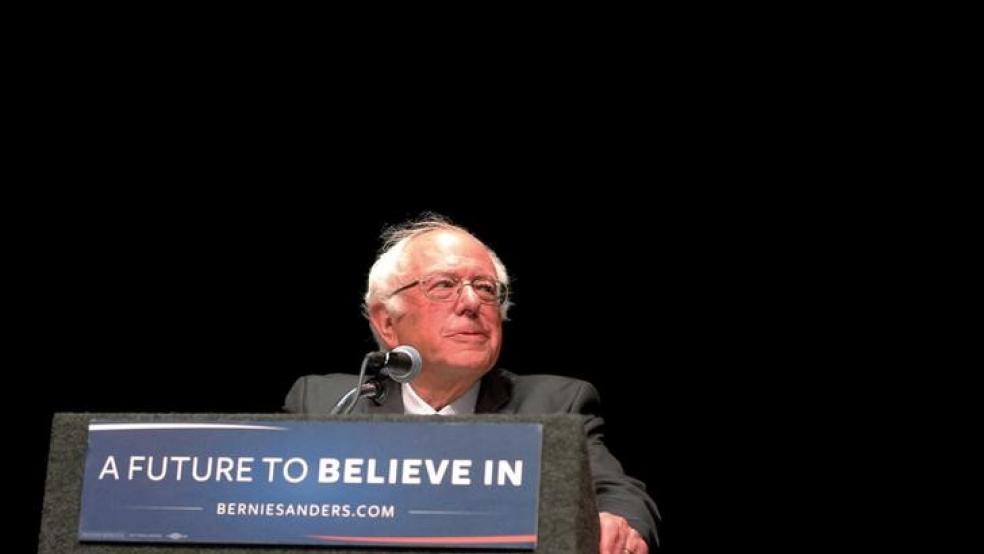In the first formal debate among Democratic presidential contenders, one participant technically doesn’t qualify. Senator Bernie Sanders has never registered as a Democrat, spending his entire political career as an unabashed Socialist. That may need to change soon, as New Hampshire in particular requires candidates to register as a member of the party for the primary in which they compete. For now, though, Sanders insists on identifying as a “democratic Socialist,” especially when it comes to economic policy.
That presents another problem for Democrats looking to select their party leader for November 2016. Socialism may be the rage on college campuses this season, but the rest of the country feels decidedly ambivalent to the 20th century’s failed economic system, if not outright antagonistic. A June poll by Gallup showed that 50 percent of all American voters would refuse to cast a ballot for an avowed socialist. Only 59 percent of Democrats would consider a socialist for the presidency, the lowest of any identities tested – a position that independents and Republicans also hold for socialists.
Related: The Pros and Cons of Bernie Sanders’ $50 Billion Tax Idea
With this reluctance to embrace socialism as a political philosophy, CNN debate moderator Anderson Cooper challenged Sanders to explain his candidacy as a practical choice for Democratic primary voters. “You call yourself a democratic socialist,” Cooper said. “How can any kind of socialist win a general election in the United States?”
“Well, we’re gonna win because first, we’re gonna explain what democratic socialism is,” Sanders replied. The Senator from Vermont then declared that capitalism had failed – a theme to which Sanders repeatedly returned during the debate – because of the concentration of wealth at the top end of the economy.
Sanders used the debate to roll out an agenda that would demand mandates for a laundry list of progressive and far-Left goals, including free public university access, forcing employers to provide paid family leave, replace the US health care market with universal Medicare, and expand Social Security benefits rather than reform the failing entitlement programs.
Related: Sanders’ Big Spending Plans Would Reinvent the U.S.
Sanders then shared his vision for the future of America, which is to transform it fundamentally into … Scandinavia. “I think we should look to countries like Denmark, like Sweden and Norway,” Sanders told Cooper, “and learn from what they have accomplished for their working people.” While that might heat up the lutefisk in my home state of Minnesota, demanding that Americans become more European is neither attractive nor particularly new for the Left.
In other words, Americans don’t really need an introduction to “democratic Socialism” after all. It looks identical to all of its earlier incarnations over the past five decades of Sanders’ public life.
Democratic Socialism seeks to redistribute wealth through direct government confiscation, nationalize industries – in this case, the health care industry and possibly the energy sector to address climate change, which Sanders declared the greatest national security threat facing the US. Sanders, like so many progressives and socialists, proposes to impose Europe’s social programs on the US.
What Sanders doesn’t want to explain is the costs involved in democratic Socialism. On Monday, Reuters columnist Daniel Indiviglio analyzed Sanders’ proposals and foresaw an $8 trillion deficit in its first decade. Expanding Medicare would cost $9.6 trillion alone, with another Obama-style infrastructure stimulus for supposedly shovel-ready jobs adding another trillion dollars. His tax hikes would only bring in $4 trillion, leaving a massive hole in the US budget. “If Sanders wants to realize his socialist dream, he’ll need much higher taxes to achieve it,” Indiviglio concludes.
That may be a low estimate. Last month, The Wall Street Journal priced out Sanders’ agenda and found that it would require “at least $18 trillion in new spending over a decade,” an amount that surpasses the current total national debt of the United States. Nationalizing the US health industry into Medicare will cost $15 trillion, according to Laura Meckler, and Sanders’ expansion of Social Security will cost another $1.2 trillion.
Related: Sanders Lumps Clinton with Koch Brothers and Adelson
Free access to public universities and colleges will add $750 billion to federal spending – and that may not take into account the inflationary incentives that increasing subsidies will produce at these schools. Meckler only finds revenues of $6.5 trillion even by Sanders’ own reckoning of the effectiveness of his soak-the-rich tax hikes, leaving more than $1 trillion a year in additional deficit spending above the heightened levels of the Obama era.
Neither of these analyses addresses the economic costs of forcing employers to provide paid family leave, either. Earlier this year, Fortune used the mandatory programs in California and New Jersey to conclude that employer costs would be negligible, but only if a national program followed the same employee-contribution model with compensation reduced to 55 percent-67 percent of normal wages. A Heritage Foundation analysis from 2011 similarly showed that employers would find ways to reduce compensation to adjust for the additional cost, as well as reducing productivity.
That, combined with the massively higher taxes that “democratic Socialism” would require to keep from collapsing, would sink the American economy. That also is nothing new; European countries have struggled with this inherent reality of socialism for two decades, and Greece has fallen into outright default over it. This agenda is a Cold War relic, a fantasy long since discredited among all but the academics and their naïve protégés.
Democratic Socialism did produce one surprising moment in the debate. After Sanders declared himself distinct from “the casino capitalist process,” Hillary Clinton rebuked Sanders, calling it “a grave mistake to turn our backs on what built the greatest middle class in history. … I love Denmark,” Clinton later said,” but we are not Denmark.”
It may not be the Lloyd Bentsen debate moment that democratic Socialism deserves, but in a Democratic primary, it will do well enough.






